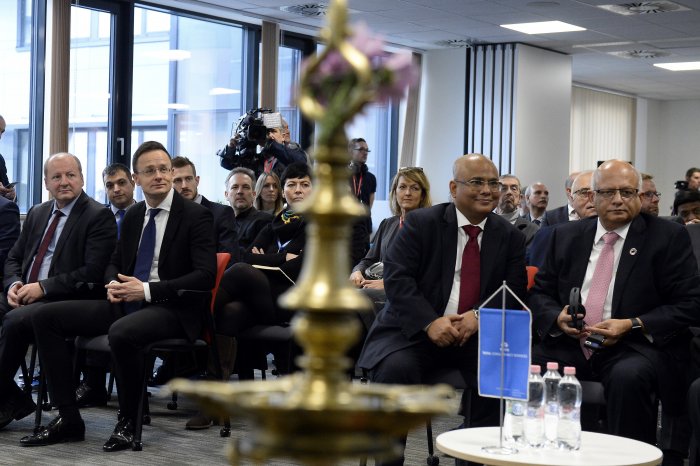Tata Intent on Upskilling and Empowering its Growth

MTI/Lajos Soós
The latest expansion by Tata Consultancy Services in Budapest, the opening of its Digital Services Center, is further proof of the success of Hungary’s “Eastern Opening” policy, Minister of Foreign Affairs and Trade Péter Szijjártó said on January 24.
From left: István Simicskó, KDNP (Christian Democrat) MP for District XI; Péter Szijjártó, Minister of Foreign Affairs and Trade; Prabal Datta, general manager of Tata Consultancy Services Hungary; and N. Ganapathy Subramaniam, TCS COO and executive director at the inauguration of the new digital services center in Budapest on January 24. MTI/Lajos Soós.
“The past 10 years have proven that the Eastern Opening policy launched by the government in 2010 was a successful decision,” the minister insisted. Some 500 new workplaces are being created at TCS’s new office in Budapest, to supplement the existing staff of 2,700.
Szijjártó told guests at the official inauguration of the center that India is one of the determining countries of the global information technology revolution, and one of the most important target countries of the Eastern Opening policy.
“Hungarian-Indian economic relations are active, the 40 major Indian enterprises currently operating in Hungary employ over 10,000 people, and during the first 10 months of last year bilateral trade flow exceeded USD 600 million,” he added.
The minister pointed out that the investment by TCS is contributing to the success of the dimensional transition of the Hungarian economy, and is providing opportunities for highly trained young Hungarians to achieve a dependable career.
TCS is part of the Tata Group, which employs more than 700,000 people worldwide, and has an average turnover exceeding USD 100 billion.
“Tata Consultancy Services is India’s largest IT company, employing 450,000 people in 50 countries around the world, and is Asia’s leading software development company and service provider. In Hungary, 2,500 young people work for Tata Consultancy Services in Budapest, and their performance has also contributed to the company’s directors having chosen the Budapest subsidiary as the site for their latest service center,” Szijjártó said.
Expanding Activities
N. Ganapathy Subramaniam, COO and executive director of TCS, highlighted the fact that the company’s activities are expanding in Budapest with the opening of the new digital service center, and the company’s efforts are reinforcing its role within the fields of artificial intelligence and automation.
“Europe as a market is important for us; we have a good customer base and our business in Europe is growing between 15% and 20% year-on-year. Europe contributes roughly about one-third of our revenues as well. In that context, the European development center in Hungary is very important for us,” Subramaniam told the Budapest Business Journal in an exclusive interview after the inauguration.
He recalled that, initially, Budapest had been targeted by TCS because of the language skills on offer here.
“Very soon, we realized that, more than the language capability, the engineering mindset and the mathematical skills that the people of Hungary have is very apt for providing technology services as well,” he said.
“The European operations are very important, and the Budapest operations are very important for the European business.” Recently TCS has re-orientated its strategy to follow a three-pronged business model in Budapest.
“Number one is Budapest for our European customers. That is the first and most important strategy. The second pillar is Budapest for our international customers, which means U.S. customers who have operations in Eastern European countries they would like to be serviced. The third part is Budapest for Hungary; we have to grow in Hungary, we have to service Hungarian customers as well,” Subramaniam said.
The size of the company’s operations has already doubled over the past three years, but the COO thinks “the potential is there to grow further”, he said, possibly even to double again.
“Of course, it is contingent on the competencies and capabilities that we are able to build, plus our ability to convince our customers to come here. The future looks positive. I think the next milestone we are looking at is that, with these 500 people, we will cross the 3,000 mark, and then we are looking at the milestone of 5,000.”
Given the labor crisis, is he happy that Prabal Datta, the general manager of TCS Hungary, will be able to find the quality of the people needed?
Good Foundation
“The basic skills we are getting out of the universities here are good. That is a good foundation. Once we hire them, we put them through our training programs, and upskill them to the extent that we require. What I understand is there are about 68,000 graduates coming out of Hungarian universities every year, but the demand is also quite high. But I think with our brand, the quality of work that we are offering, we believe that we will be able to get the number that we need,” Subramaniam told the BBJ.
“Those graduates, if I can teach them advanced skills of algorithmic thinking, advanced skills of artificial intelligence, and machine learning, then they will become a lot more relevant for us.”
He says upskilling and empowering are an important part of what Tata does with its staff. “We will teach you to automate the repetitive part of your work, so that you can be a lot more creative.[…] Our approach to this whole thing is empower people with the tools by which they can distinguish what they are doing and give them ownership of their own automation, that is the journey that we are taking. In the process we are impressing upon them that design and empathy are for the humans, the rest can be done by algorithms,” Subramaniam said.
“I am very confident of the future. I think it is our ability to motivate the people here, motivate the workforce of Hungary to learn new technologies, being agile, being able to automate, being able to understand cloud technologies and being more relevant to our business operations in Europe that matters.”
SUPPORT THE BUDAPEST BUSINESS JOURNAL
Producing journalism that is worthy of the name is a costly business. For 27 years, the publishers, editors and reporters of the Budapest Business Journal have striven to bring you business news that works, information that you can trust, that is factual, accurate and presented without fear or favor.
Newspaper organizations across the globe have struggled to find a business model that allows them to continue to excel, without compromising their ability to perform. Most recently, some have experimented with the idea of involving their most important stakeholders, their readers.
We would like to offer that same opportunity to our readers. We would like to invite you to help us deliver the quality business journalism you require. Hit our Support the BBJ button and you can choose the how much and how often you send us your contributions.








